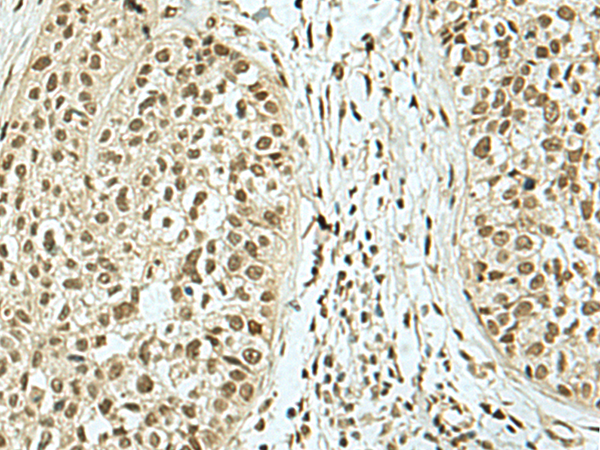
| WB | 咨询技术 | Human,Mouse,Rat |
| IF | 咨询技术 | Human,Mouse,Rat |
| IHC | 1/40-1/200 | Human,Mouse,Rat |
| ICC | 技术咨询 | Human,Mouse,Rat |
| FCM | 咨询技术 | Human,Mouse,Rat |
| Elisa | 1/5000-1/10000 | Human,Mouse,Rat |
| Aliases | FBP2; KSRP; FUBP2 |
| Host/Isotype | Rabbit IgG |
| Antibody Type | Primary antibody |
| Storage | Store at 4°C short term. Aliquot and store at -20°C long term. Avoid freeze/thaw cycles. |
| Species Reactivity | Human, Mouse, Rat |
| Immunogen | Synthetic peptide of human KHSRP |
| Formulation | Purified antibody in PBS with 0.05% sodium azide and 50% glycerol. |
+ +
以下是3篇关于KHSRP抗体的参考文献及其简要摘要:
---
1. **"KSRP promotes maturation of primary let-7 by bridging the Microprocessor complex to the exonuclease XRN2"**
*作者:Ruggiero T. et al. (2020)*
**摘要**:本研究利用KHSRP抗体进行免疫沉淀实验,揭示了KSRP蛋白通过与Microprocessor复合物及XRN2外切酶相互作用,促进let-7 microRNA前体的成熟,调节RNA加工过程。
2. **"The RNA-binding protein KSRP controls miR-21 maturation via interaction with the Microprocessor complex"**
*作者:Trabucchi M. et al. (2019)*
**摘要**:通过KHSRP抗体的ChIP-seq和RNA结合分析,发现KSRP通过结合miR-21前体并与Drosha/DGCR8复合物协同,调控miR-21的生物合成,影响癌症细胞的增殖和迁移。
3. **"KSRP regulates pro-inflammatory cytokines by post-transcriptional mechanisms in macrophages"**
*作者:Lin Y. et al. (2018)*
**摘要**:利用KHSRP抗体的Western blot和RNA免疫沉淀技术,证实KSRP通过结合并降解TNF-α和IL-6 mRNA的3'UTR区域,抑制巨噬细胞中促炎细胞因子的表达,调控免疫应答。
---
如需具体文献链接或补充信息,请进一步说明。
KHSRP (KH-type splicing regulatory protein), also known as KSRP or FBP2. is an RNA-binding protein belonging to the heterogeneous nuclear ribonucleoprotein (hnRNP) family. It contains four K-homology (KH) domains that enable sequence-specific interactions with RNA, particularly AU-rich elements (AREs) in the 3' untranslated regions (UTRs) of labile mRNAs. KHSRP plays a dual role in post-transcriptional gene regulation: it promotes mRNA decay by recruiting deadenylases and exonucleases, while also facilitating the biogenesis of select microRNAs (miRNAs) through interactions with Drosha and Dicer complexes. This protein is implicated in diverse cellular processes, including inflammation, differentiation, and stress responses.
Antibodies against KHSRP are widely used to study its expression, localization, and molecular interactions. They are critical tools for techniques like Western blotting, immunoprecipitation, and immunofluorescence, helping to elucidate KHSRP's role in mRNA stability, miRNA processing, and disease mechanisms. Dysregulation of KHSRP has been linked to cancers, neurodegenerative disorders, and autoimmune conditions, making its study clinically relevant. Commercial KHSRP antibodies are typically raised against specific epitopes, such as the N-terminal or KH domains, and validated for species cross-reactivity (e.g., human, mouse, rat). Proper validation ensures specificity, minimizing off-target effects in experimental models.
×